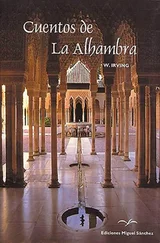Washington Irving - The Alhambra
Здесь есть возможность читать онлайн «Washington Irving - The Alhambra» — ознакомительный отрывок электронной книги совершенно бесплатно, а после прочтения отрывка купить полную версию. В некоторых случаях можно слушать аудио, скачать через торрент в формате fb2 и присутствует краткое содержание. Жанр: unrecognised, на английском языке. Описание произведения, (предисловие) а так же отзывы посетителей доступны на портале библиотеки ЛибКат.
- Название:The Alhambra
- Автор:
- Жанр:
- Год:неизвестен
- ISBN:нет данных
- Рейтинг книги:5 / 5. Голосов: 1
-
Избранное:Добавить в избранное
- Отзывы:
-
Ваша оценка:
- 100
- 1
- 2
- 3
- 4
- 5
The Alhambra: краткое содержание, описание и аннотация
Предлагаем к чтению аннотацию, описание, краткое содержание или предисловие (зависит от того, что написал сам автор книги «The Alhambra»). Если вы не нашли необходимую информацию о книге — напишите в комментариях, мы постараемся отыскать её.
The Alhambra — читать онлайн ознакомительный отрывок
Ниже представлен текст книги, разбитый по страницам. Система сохранения места последней прочитанной страницы, позволяет с удобством читать онлайн бесплатно книгу «The Alhambra», без необходимости каждый раз заново искать на чём Вы остановились. Поставьте закладку, и сможете в любой момент перейти на страницу, на которой закончили чтение.
Интервал:
Закладка:
As he approached Granada on his return he beheld arches of triumph which had been erected in honor of his martial exploits. The people thronged forth to see him with impatient joy, for his benignant rule had won all hearts. Wherever he passed he was hailed with acclamations as “El Ghalib!” (the conqueror). Alhamar gave a melancholy shake of the head on hearing the appellation. “ Wa le ghalib ile Aláh! ” (there is no conqueror but God) exclaimed he. From that time forward this exclamation became his motto, and the motto of his descendants, and appears to this day emblazoned on his escutcheons in the halls of the Alhambra.
Alhamar had purchased peace by submission to the Christian yoke; but he was conscious that, with elements so discordant and motives for hostility so deep and ancient, it could not be permanent. Acting, therefore, upon the old maxim, “Arm thyself in peace and clothe thyself in summer,” he improved the present interval of tranquillity by fortifying his dominions, replenishing his arsenals, and promoting those useful arts which give wealth and real power. He confided the command of his various cities to such as had distinguished themselves by valor and prudence, and who seemed most acceptable to the people. He organized a vigilant police, and established rigid rules for the administration of justice. The poor and the distressed always found ready admission to his presence, and he attended personally to their assistance and redress. He erected hospitals for the blind, the aged, and infirm, and all those incapable of labor, and visited them frequently; not on set days with pomp and form, so as to give time for everything to be put in order, and every abuse concealed, but suddenly, and unexpectedly, informing himself, by actual observation and close inquiry, of the treatment of the sick, and the conduct of those appointed to administer to their relief. He founded schools and colleges, which he visited in the same manner, inspecting personally the instruction of the youth. He established butcheries and public ovens, that the people might be furnished with wholesome provisions at just and regular prices. He introduced abundant streams of water into the city, erecting baths and fountains, and constructing aqueducts and canals to irrigate and fertilize the Vega. By these means prosperity and abundance prevailed in this beautiful city; its gates were thronged with commerce, and its warehouses filled with luxuries and merchandise of every clime and country.
He moreover gave premiums and privileges to the best artisans; improved the breed of horses and other domestic animals; encouraged husbandry; and increased the natural fertility of the soil twofold by his protection, making the lovely valleys of his kingdom to bloom like gardens. He fostered also the growth and fabrication of silk, until the looms of Granada surpassed even those of Syria in the fineness and beauty of their productions. He moreover caused the mines of gold and silver and other metals, found in the mountainous regions of his dominions, to be diligently worked, and was the first king of Granada who struck money of gold and silver with his name, taking great care that the coins should be skilfully executed.
It was towards the middle of the thirteenth century, and just after his return from the siege of Seville, that he commenced the splendid palace of the Alhambra; superintending the building of it in person; mingling frequently among the artists and workmen, and directing their labors.
Though thus magnificent in his works and great in his enterprises, he was simple in his person and moderate in his enjoyments. His dress was not merely void of splendor, but so plain as not to distinguish him from his subjects. His harem boasted but few beauties, and these he visited but seldom, though they were entertained with great magnificence. His wives were daughters of the principal nobles, and were treated by him as friends and rational companions. What is more, he managed to make them live in friendship with one another. He passed much of his time in his gardens; especially in those of the Alhambra, which he had stored with the rarest plants and the most beautiful and aromatic flowers. Here he delighted himself in reading histories, or in causing them to be read and related to him, and sometimes, in intervals of leisure, employed himself in the instruction of his three sons, for whom he had provided the most learned and virtuous masters.
As he had frankly and voluntarily offered himself a tributary vassal to Ferdinand, so he always remained loyal to his word, giving him repeated proofs of fidelity and attachment. When that renowned monarch died in Seville in 1254, Alhamar sent ambassadors to condole with his successor, Alonzo X., and with them a gallant train of a hundred Moorish cavaliers of distinguished rank, who were to attend round the royal bier during the funeral ceremonies, each bearing a lighted taper. This grand testimonial of respect was repeated by the Moslem monarch during the remainder of his life on each anniversary of the death of King Ferdinand el Santo, when the hundred Moorish knights repaired from Granada to Seville, and took their stations with lighted tapers in the centre of the sumptuous cathedral round the cenotaph of the illustrious deceased.
Alhamar retained his faculties and vigor to an advanced age. In his seventy-ninth year (A.D. 1272) he took the field on horseback, accompanied by the flower of his chivalry, to resist an invasion of his territories. As the army sallied forth from Granada, one of the principal adalides, or guides, who rode in the advance, accidentally broke his lance against the arch of the gate. The counsellors of the king, alarmed by this circumstance, which was considered an evil omen, entreated him to return. Their supplications were in vain. The king persisted, and at noontide the omen, say the Moorish chroniclers, was fatally fulfilled. Alhamar was suddenly struck with illness, and had nearly fallen from his horse. He was placed on a litter, and borne back towards Granada, but his illness increased to such a degree that they were obliged to pitch his tent in the Vega. His physicians were filled with consternation, not knowing what remedy to prescribe. In a few hours he died, vomiting blood and in violent convulsions. The Castilian prince, Don Philip, brother of Alonzo X., was by his side when he expired. His body was embalmed, enclosed in a silver coffin, and buried in the Alhambra in a sepulchre of precious marble, amidst the unfeigned lamentations of his subjects, who bewailed him as a parent.
I have said that he was the first of the illustrious line of Nasar that sat upon a throne. I may add that he was the founder of a brilliant kingdom which will ever be famous in history and romance as the last rallying-place of Moslem power and splendor in the Peninsula. Though his undertakings were vast, and his expenditures immense, yet his treasury was always full; and this seeming contradiction gave rise to the story that he was versed in magic art, and possessed of the secret for transmuting baser metals into gold. Those who have attended to his domestic policy, as here set forth, will easily understand the natural magic and simple alchemy which made his ample treasury to overflow.
YUSEF ABUL HAGIG
THE FINISHER OF THE ALHAMBRA
TO the foregoing particulars, concerning the Moslem princes who once reigned in these halls, I shall add a brief notice of the monarch who completed and embellished the Alhambra. Yusef Abul Hagig (or, as it is sometimes written, Haxis) was another prince of the noble line of Nasar. He ascended the throne of Granada in the year of grace 1333, and is described by Moslem writers as having a noble presence, great bodily strength, and a fair complexion; and the majesty of his countenance increased, say they, by suffering his beard to grow to a dignified length and dyeing it black. His manners were gentle, affable, and urbane; he carried the benignity of his nature into warfare, prohibiting all wanton cruelty, and enjoining mercy and protection towards women and children, the aged and infirm, and all friars and other persons of holy and recluse life. But though he possessed the courage common to generous spirits, the bent of his genius was more for peace than war, and though repeatedly obliged by circumstances to take up arms, he was generally unfortunate.
Читать дальшеИнтервал:
Закладка:
Похожие книги на «The Alhambra»
Представляем Вашему вниманию похожие книги на «The Alhambra» списком для выбора. Мы отобрали схожую по названию и смыслу литературу в надежде предоставить читателям больше вариантов отыскать новые, интересные, ещё непрочитанные произведения.
Обсуждение, отзывы о книге «The Alhambra» и просто собственные мнения читателей. Оставьте ваши комментарии, напишите, что Вы думаете о произведении, его смысле или главных героях. Укажите что конкретно понравилось, а что нет, и почему Вы так считаете.












